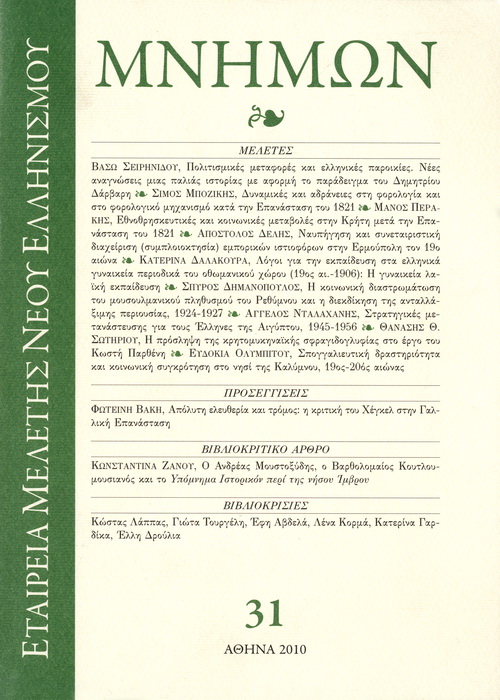Απόλυτη ελευθερία και τρόμος: η κριτική του Χέγκελ στην Γαλλική Επανάσταση <html />
Περίληψη
Fotini Vaki, Absolute freedom and Terror: Hegel’s critique of the French Revolution
The present paper will be mainly concerned with Hegel’s criticism of the French Revolution as it takes place in his Phenomenology of Spirit. The main purpose of the paper consists in disclosing how the Hegelian criticism in question anticipates the subsequent liberal attitude vis-à-vis the revolution in general. That attitude recognizes the historical necessity of the right of freedom but vehemently renounces revolutionary violence as the means of its institution. The standpoint of the liberal criticism is Terror, which is interpreted rather as the necessary outcome of the Jacobins’ attempt to realize historically Rousseau’s general will than a historical “deviation”. In the first part of the paper I will focus on Hegel’s interpretation of the Terror, which anticipates the subsequent liberal encomium of 1789 and the simultaneous condemnation of 1793. In turn, I will attempt to show that Hegel’s interpretation of Rousseau’s general will as the theoretical source of Terror relies on a misunderstanding. According to that, Hegel identifies the general will with the will of all. Nevertheless, Rousseau’s general will, as it has been delineated in the Social Contract, is paradoxically not opposed to the Hegelian state as the “moment” of Reason’s realization in history. On the contrary, there is a striking affinity between Rousseau’s general will and the Hegelian state inasmuch as the former regards the public good as its sole end while the latter is perceived as an ethical totality which is the rational end of the individuals that constitute it.
Λεπτομέρειες άρθρου
- Πώς να δημιουργήσετε Αναφορές
-
ΒΑΚΗ Φ. (2012). Απόλυτη ελευθερία και τρόμος: η κριτική του Χέγκελ στην Γαλλική Επανάσταση: <html />. Μνήμων, 31, 267–281. https://doi.org/10.12681/mnimon.31
- Τεύχος
- Τόμ. 31 (2010)
- Ενότητα
- ΠΡΟΣΕΓΓΙΣΕΙΣ
Οι συγγραφείς των άρθρων που δημοσιεύονται στο Μνήμονα διατηρούν τα δικαιώματα πνευματικής ιδιοκτησίας επί των άρθρων τους, δίνοντας στο περιοδικό το δικαίωμα της πρώτης δημοσίευσης. Άρθρα που δημοσιεύονται στο Μνήμονα μπορούν να χρησιμοποιούνται ελεύθερα, χωρίς δικαίωμα τροποποίησης (δημιουργία παράγωγου έργου) με αναφορά στο συγγραφέα και στην πρώτη δημοσίευση για μη κερδοσκοπικούς σκοπούς(άδεια Creative Commons 4.0). To Εθνικό Ίδρυμα Ερευνών διατηρεί το δικαίωμα να δημοσιεύει, να αναπαραγάγει, να παρουσιάζει στο κοινό, να διανέμει και χρησιμοποιεί άρθρα που δημοσιεύονται στο Μνήμονα σε οποιοδήποτε μέσο και μορφή είτε μεμονωμένα είτε ως μέρη συλλογικών έργων, για όλο το χρόνο διάρκειας προστασίας της πνευματικής ιδιοκτησίας και για όλες τις χώρες του κόσμου. Αυτό περιλαμβάνει ενδεικτικά και όχι αποκλειστικά, το δικαίωμα δημοσίευσης των άρθρων σε τεύχη του περιοδικού Μνήμων, αναπαραγωγής και διανομής μεμονωμένων αντιγράφων των άρθρων, αναπαραγωγής ολόκληρων των άρθρων σε άλλη έκδοση του ΕΙΕ, και αναπαραγωγής και διανομής των άρθρων ή περίληψης αυτών με χρήση πληροφορικού συστήματος αποθετηρίου.



